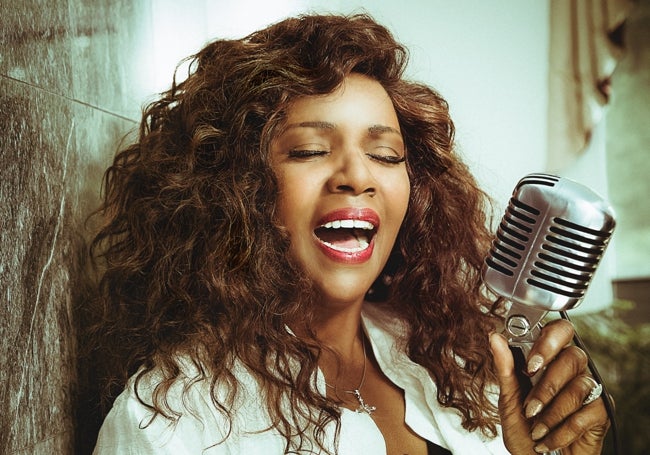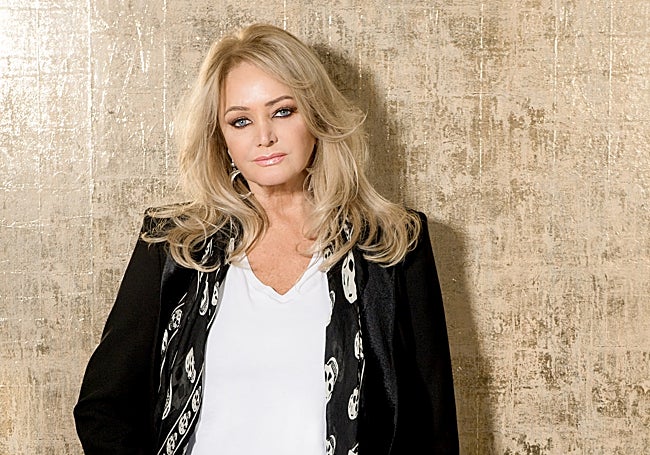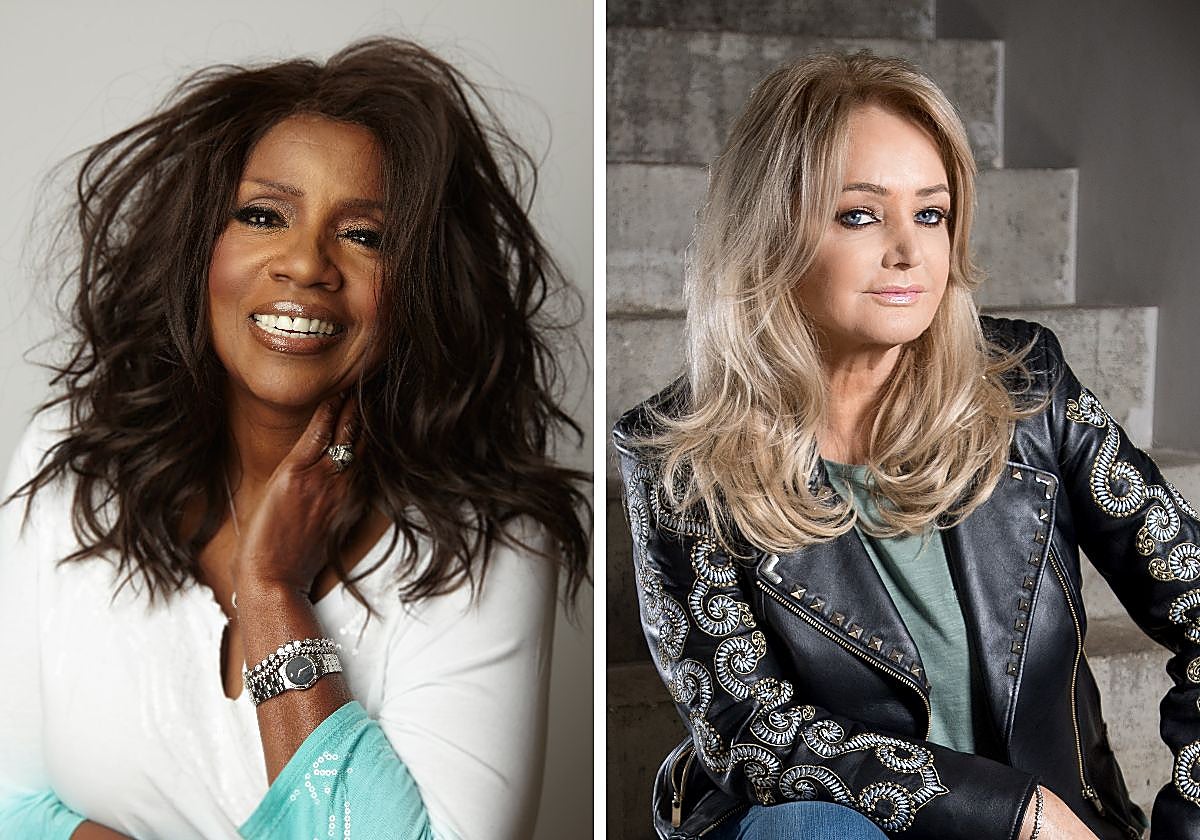Gloria Gaynor and Bonnie Tyler: two divas talk to SUR before sharing a stage in Malaga
One is the queen of disco; the other is one of the most famous voices of pop rock. Together they promise a night of nostalgia this Tuesday at the Sabatic Fest in Malaga
They have had parallel careers. 1978 was a key year for both. Gloria Gaynor (born New Jersey, 1943) released what would be the biggest hit of her career in the United States, a timeless anthem that still revolutionises any party, I Will Survive. Meanwhile, from the UK, the husky voice of a young Bonnie Tyler (born Skewen, Wales 1951) surprised the world with the rock ballad It's a heartache.
Forty-five years on both singers are still active touring the world, setting an example of resistance and resilience in a music market where young and urban rhythms prevail.
Both divas of pop and rock coincide on the same night on the same stage for the first time tonight, Tuesday 15 August. The unique event is at the Sabatic Fest in Malaga, the new concert venue that has been set up throughout the summer at Malaga's Autocine (10pm, doors open at 9pm; 41.80 euros).
Before the concert they answer questions sent by email by this newspaper. Gloria Gaynor responds almost immediately; Bonnie Tyler takes a little longer. Both are brief, but forceful.
-
Gloria Gaynor
'I had to struggle to have I Will Survive recognised as a song worth promoting'

Zoom

She is the queen of disco music, the voice of anthems that have never gone out of fashion and have withstood major industry changes during the 50 years of her career. At her 79 years of age, she still takes to the stage to deliver what she describes as "uplifting and empowering" music, including classics like I Will Survive and I Am What I Am.
-Your concert at Sabatic Fest will be one for old nostalgics. Would that describe you?
-I would say so. I like a lot of old music, art, architecture, and artifacts.
- People are always using the saying 'old rockers never die', but they mainly refer to men. Could the same be said of women or is the passing of time harder on them?
-I haven't found the passing of time hard on me. So, if I'm a good example of the stamina and resilience of female artists, then I'd say the phrase applies to us as well.
-Have you ever been tempted to step down from the stage for good?
-Once because of my back injury, I thought I might have to, but I've never wanted to.
-Today people talk a lot about the empowerment of women - in the world of music too. Have you ever felt that you were treated differently because of your gender?
-Yes, I have always felt that men get a lot more respect regarding what should happen with their careers regarding direction and image.
"I've always felt that men get a lot more respect regarding direction and image in their careers"
-You are a diva for the LGBT+ community. Why do you think your songs have connected so well with that community?
-My music is encouraging, uplifting and empowering which works for anyone.
-Your name is often coupled with the word 'legend'. Does that give you vertigo?
-In the past, I always thought of a legend as someone who has retired or passed away. Perhaps the meaning is changing. I feel blessed to be counted among the people who are seen as legends.
-Your global success is unquestionable, but has music given you bad times too?
-Music has only ever given me good times. However, some of the people who are in the music industry have given me bad times. The struggle with the «powers that be» at the record company to have I Will Survive recognised as a song worth promoting, is a perfect example of that.
-You have lived through a radical transformation of the music industry. What is the secret to surviving all those changes?
-Classics always involve the basic needs and desires of human kind. If you keep them a part of anything you're trying to share with your public, you will survive.
-What music do you listen to today?
-I listen to gospel, pop, contemporary rhythm and blues, and country music. I have a broad taste in music.
-Is there anything you've always wanted to do and haven't done yet?
-I want to do a gospel concert at Carnegie Hall in New York.
-How would you like to be remembered?
-I would like to be remembered as someone who always sought to use her gifts, talents and abilities to uplift, encourage and inspire others to be all that God created them to be.
-
Bonnie Tyler
'The word legend is used too easily these days. Legends are people like Tina Turner, Janis Joplin'

Zoom

What seemed like the end of her career became the beginning of her success. In the mid-1970s, when she was in her twenties, Bonnie Tyler had to undergo an operation to remove some nodules that had been detected in her throat. She sang again, but she was no longer the same. Her voice had become husky and rough, a texture that made her unique and with which she gives personality to some of the most famous rock ballads in history (It's a Heartache, Total Eclipse of the Heart, Holding Out for a Hero).
-Your concert at Sabatic Fest will be one for old nostalgics. Would that describe you?
-I'm an old rock and roll fossil and proud of it.
-People are always using the saying 'old rockers never die', but they mainly refer to men. Could the same be said of women or is the passing of time harder on them?
-I don't think that it is.
-Have you ever been tempted to step down from the stage for good?
-No, not ever, I'll probably die onstage.
-Today people talk a lot about the empowerment of women - in the world of music too. Have you ever felt that you were treated differently because of your gender?
-No I haven't ever felt that, maybe because I am a strong woman.
- You are a diva for the LGBT+ community. Why do you think your songs have connected so well with them?
-I really don't know but I am extremely grateful for that.
She proudly defines herself as an "old rock and roll fossil", a "strong" woman who has never thought about retirement
-Your name is often coupled with the word `legend'. Does that give you vertigo?
-I think that the word legend is used too easily these days. Legends are people like Tina Turner, Janis Joplin, Paul McCartney, Rod Stewart, Bruce Springsteen, Mick Jagger and Cliff Richard...
-Your global success is unquestionable, but has music given you bad times too?
-No, my music has seen me through good times and bad times.
You have lived through a radical transformation of the music industry. What is the secret to surviving all those changes?
-If a song is good and gives you the shivers then it doesn't matter what genre or platform it is. Good music is good music.
-What music do you listen to today?
-I mainly listen to pop rock, there's still loads of great new music about, such as Pink, James Arthur, Lewis Capaldi and more.
-Is there anything you've always wanted to do and haven't done yet?
-I'd love to play at Wembley Stadium one day.
-How would you like to be remembered?
-As a family loving down to earth and generous person who got to sing some great songs.

